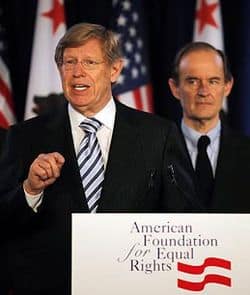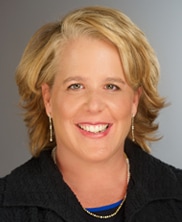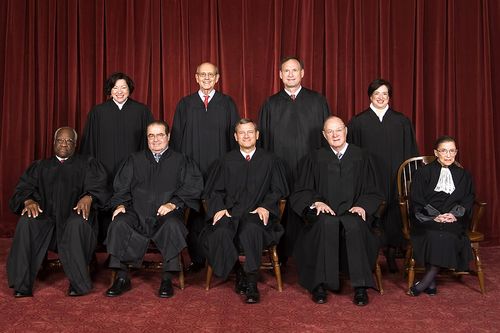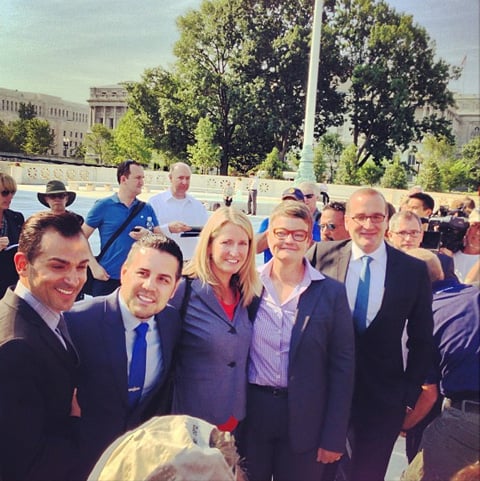This post is a continuation – to read the first part, click HERE.
In Part I of this post, we took Kenji Yoshino's invitation, sparked by his book, Speak Now, on Hollingsworth v. Perry, to take a look at the context for the upcoming Supreme Court marriage argument. We traced the key legal history back from 1972 and Baker v. Nelson to the passage of Defense of Marriage Act (DOMA). I have been arguing that a multi-pronged strategy was necessary to win marriage rights, but the step-by-step litigation strategy was the central mode of success. Let's pick up where we left off.
 The preemptive nature of DOMA was its most striking element. In 1996, there were no legally married gay couples in the states, and yet Congress still felt the need to discriminate against them and give states the right to ignore legal marriages just because the individuals are gay. It wasn't until 2004 when Massachusetts legalized marriage for gays that the effects of DOMA could actually be felt by a real live person. Between 1996 and 2004, advocates went to work in progressive states, mostly in the Northeast, to set the groundwork for marriage rights. After Massachusetts took the jump, 13 states passed constitutional bans on marriage equality. Others followed. But Massachusetts was joined by a handful of other states on the pro-equality side, including Connecticut, Vermont, Iowa, and New Hampshire.
The preemptive nature of DOMA was its most striking element. In 1996, there were no legally married gay couples in the states, and yet Congress still felt the need to discriminate against them and give states the right to ignore legal marriages just because the individuals are gay. It wasn't until 2004 when Massachusetts legalized marriage for gays that the effects of DOMA could actually be felt by a real live person. Between 1996 and 2004, advocates went to work in progressive states, mostly in the Northeast, to set the groundwork for marriage rights. After Massachusetts took the jump, 13 states passed constitutional bans on marriage equality. Others followed. But Massachusetts was joined by a handful of other states on the pro-equality side, including Connecticut, Vermont, Iowa, and New Hampshire.
California was a unique case. In re Marriage Cases brought marriage equality to that state in 2008, but that freedom was famously taken away in Proposition 8. The denial of marriage rights in a state like California — the progressive home of the Castro and West Hollywood (and countless other cities and towns gay Californians called home) — felt particularly harsh. A group of activists, led by 4 pioneering plaintiffs and represented by an attorney "odd couple" of Ted Olson and David Boies, decided to challenge Prop 8 in federal court.
CONTINUED, AFTER THE JUMP…
What followed was a remarkable trial where plaintiffs' lawyers brought in experts and introduced testimony from family members about the effects of the denial of marriage rights.
 And lawyers supporting the ban brought their own vitriol to the stand. As Professor Yoshino argues, this aspect of Perry — the trial — was among its most significant contributions to the marriage equality fight. Trials force us to lay bare our arguments for all to see. They force us to put aside emotional rhetoric and meet burdens of proof in front of a dispassionate magistrate. They tear away the muck of political campaigns and show the world who the parties really are: Are they victims? Liars? Oppressors?
And lawyers supporting the ban brought their own vitriol to the stand. As Professor Yoshino argues, this aspect of Perry — the trial — was among its most significant contributions to the marriage equality fight. Trials force us to lay bare our arguments for all to see. They force us to put aside emotional rhetoric and meet burdens of proof in front of a dispassionate magistrate. They tear away the muck of political campaigns and show the world who the parties really are: Are they victims? Liars? Oppressors?
The trial also had the effect of gathering factual evidence about the practical effect of marriage discrimination on families, children, and the state, and the lack of any effect on heterosexual couples, religion, and collective morality. The Perry trial was the first time marriage equality had its day in court and the echoes of that day are still being felt.
But Perry was not the only federal case ongoing at the time. As gay couples starting marrying after 2004, they started feeling the burdens imposed upon them by DOMA.
Both problems required attention. In keeping with the theme of setting the appropriate legal foundation for the ultimate goal of a nationwide right to marry, several DOMA cases were filed and many in the community hoped that one of them would reach the Supreme Court before the Prop 8 case. To some, DOMA discrimination was stark, obvious, and easy to understand: in the world of legally married couples, legally married gay couples were treated differently. The underlying right to marry seemed like a step further, a little more controversial, and, perhaps, not yet ready for prime time. At a time when only a handful of states allowed gays to marry, setting aside the underlying question of gay marriage bans seemed like a good idea.
 Edie Windsor's case, led by Paul Weiss's Roberta Kaplan (right), got to the Supreme Court first. In his majority opinion in Windsor, Justice Kennedy, who wrote Romer and Lawrence, not only handily tossed every pretextual argument in favor of the antigay marriage definition — the familiar references to children, tradition, and so forth — but also rested the decision on the inherent dignity of gay persons, the importance of protecting the thousands of children of gay couples, and the Constitutional protections afforded all Americans.
Edie Windsor's case, led by Paul Weiss's Roberta Kaplan (right), got to the Supreme Court first. In his majority opinion in Windsor, Justice Kennedy, who wrote Romer and Lawrence, not only handily tossed every pretextual argument in favor of the antigay marriage definition — the familiar references to children, tradition, and so forth — but also rested the decision on the inherent dignity of gay persons, the importance of protecting the thousands of children of gay couples, and the Constitutional protections afforded all Americans.
With Windsor in place, the marriage bans started to fall. From June 2013 to today, marriage equality went from a handful of states to the vast majority of the country through appellate court decision after appellate court decision. All of them cited Windsor. Even seen narrowly, Windsor stands for the proposition that discriminating against legally married gay couples violates their constitutional rights. It also holds that all the reasons anti-equality forces have posed to justify not just DOMA, but every underlying state ban on gay marriage, do not sufficiently justify the discrimination. This may be Windsor's most significant legal contribution: if the rationales didn't meet constitutional muster for DOMA, they are not going to meet constitutional muster for state bans.
Where Windsor may be the most important legal precedent, Perry, which was cut short because of a procedural problem, was the ignition for our cataclysmic success. As Professor Yoshino argues, the Perry trial put antigay discrimination in front of the public. It highlighted our opponents' true antigay beliefs. It made our success possible.
***
Follow me on Twitter.
Ari Ezra Waldman is Associate Professor of Law and the Director of the Institute for Information Law and Policy at New York Law School. He holds a Ph.D. from Columbia University, a J.D. from Harvard Law School, and a B.A. from Harvard College. Ari writes regular posts on law and various LGBT issues.





